GET A SOLAR BATTERY STORAGE FEASIBILITY REPORT
Ellinbank Dairy Research Center 100kW Solar Battery Installation
Alpha-ESS Commercial Solar Battery Storage System
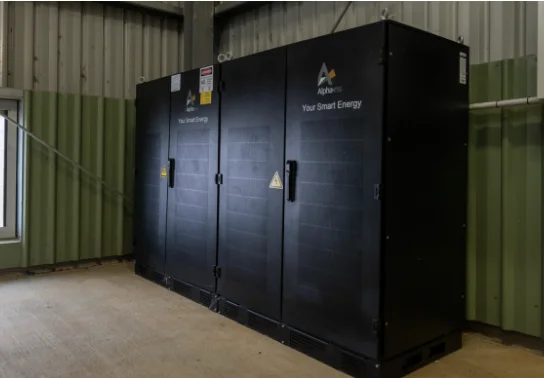
Ellinbank Solar Battery Storage – Striving toward carbon-neutral farming
Ellinbank Dairy Research Centre is a fully functional dairy farm located in Gippsland, Victoria. It’s wholly run by the Department of Jobs, Precincts and Regions to provide valuable research to the industry and assist in making dairy farming more profitable and sustainable within Victoria. Dairy farming, by its very nature, is environmentally taxing. Not only is the processing of milk an energy-intensive process, but the livestock themselves contribute to greenhouse gases. Ellinbank is dedicated to the ambitious goal of becoming a complete carbon-neutral farm with the help of our solar battery storage system. So far, they have achieved huge steps toward their target with initiatives such as electric farm vehicles.
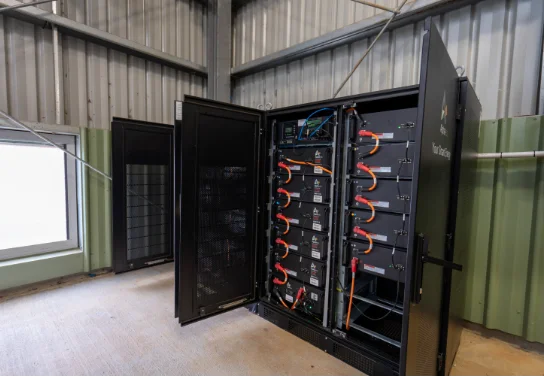
A sustainable energy source
Part of the next steps the Research Centre took was to reduce their reliance on electricity from the grid. They went to the market seeking a 99kW renewable energy source combined with a 30kWh solar battery. This power unit was later upsized to 100kWh, making it one of only a small handful in Victoria in that size range.
In recent news, Victoria has announced it will be expanding its renewable energy depository volume to 6.3 GW in the hopes to provide sufficient enough power to homes across half of the state by 2035. The government is planning to give $119 million to a 125MW solar battery inverter that will be placed in Murray Renewable Energy Zone, found in Victoria’s northwest between Bendigo and Redcliffs. They are also in the works to pay out $38.2 million on four different clean energy initiatives, putting $19.3 million into two bioenergy initiatives at farms in Barwon and our client, Ellibank Dairy Research Centre in Gippsland.
KUGA Electrical won the tender and set about designing the solution. The solution had to be designed such that it was accessible for educational purposes, and that the battery operated most effectively to complement the farm’s energy usage profile. KUGA Electrical supplied a solar battery storage installation to assist in this goal and showcase the technology to other Australian farmers.
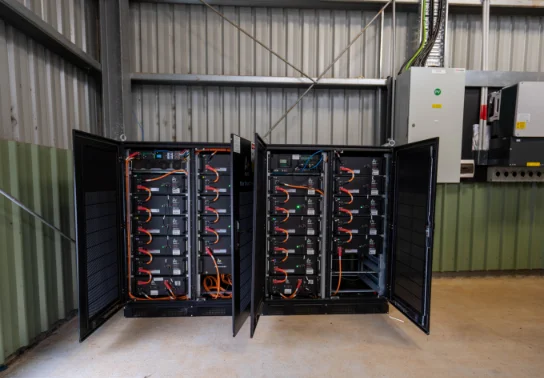
Solar battery storage
Originally, the specification for the project included zinc-bromine flow power units. A large part of the spec for this was because these were manufactured in Australia. This technology was ultimately dropped in favour of the lithium-ion solution offered by KUGA (Alpha-ESS).
Despite being a Chinese company, Alpha ESS has committed to building a very large manufacturing facility in South Australia. As such, they are already subsidised by the SA State Government and will rapidly increase their local presence. The final power unit solution installed by KUGA Electrical was the Alpha ESS Starion T 30, with 102kWh of usable deposit capacity.
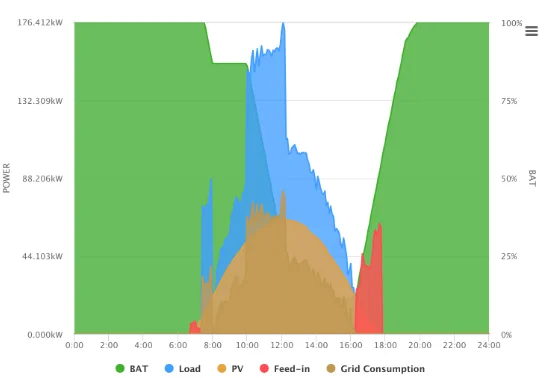
Advanced power unit monitoring
Our commercial solar battery storage system comes with detailed monitoring applications and the ability to configure power unit dispatch requirements for your specific business. The image shows the power unit charge in green, solar PV production in yellow, export in red and grid consumption in blue. This example is typical of a business with a heavy daytime load.
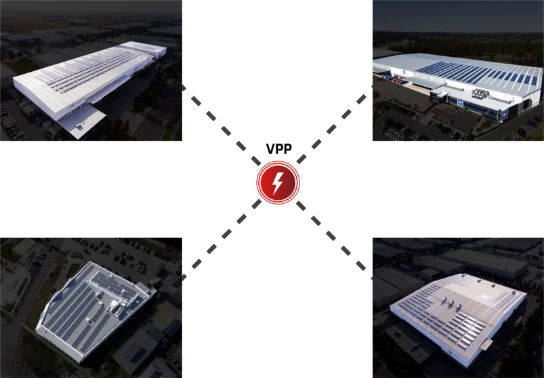
Why solar battery storage?
Solar energy is a fantastic way to draw clean energy directly from the sun. It is often not possible to match the energy requirements of a commercial farm exactly with the peak production from the sun.
Rather than waste the electricity generated by the sun if it is not required, the power gets fed back into the electricity grid, where the owner of the program receives a credit. It is still preferable to use renewable energy if possible because the credit is substantially less than the power costs to buy.
In the case of Ellinbank, it was decided they would prefer to save this valuable clean power and use it at times of peak demand. This reduces electrical costs even further since they get charged based on the maximum electrical draw every month. This is measured in 15-minute intervals. This also reduces the electrical strain on the farm’s electrical supply, lowering the risk of circuit breakers tripping.
KUGAs design team analysed the historical electricity requirements of the farm and programmed a forced discharge of the battery during this time each day. This is a feature known as “load shedding” and further increases the savings produced by a solar battery storage system.
How much does solar battery storage cost?
The biggest obstacle to businesses installing a solar battery storage system is the upfront cost. The good news is that this cost is rapidly reducing. With large and powerful Lithium-Ion power units becoming exceedingly popular in the automotive industry, energy storage was bound to follow suit. According to Bloomberg, Since 2010, the cost of Lithium-ion power units has dropped by 85%. At the same time, global manufacturing of lithium-ion power units has close to tripled since 2014. In dollar terms: basic Lithium-ion power unit pricing has gone from $1,706 per kilowatt-hour in 2010 to $259/kWh in 2018. By 2024, power unit costs could be as low as $147/kWh. For commercial solar battery storage, this pricing for a completely installed three-phase power unit pack translates to the $600/kWh mark. Here is an example to put into perspective: the Tesla Model S has a power unit capacity of 85kWh, and weighs over 500KG. To induct an equivalent capacity grid-connect unit for your business would cost around $50,000.
The best solar battery storage solutions
In today’s energy environment, there are a host of experimental and promising battery technologies. In general- there are only four main battery technologies:
- Lithium-ion(Li-ion)
- Nickel Cadmium(Ni-Cd)
- Nickel-Metal Hydride(Ni-MH)
- Lead-Acid
Of these battery sources, Lithium-ion technology is the typically stored energy solution. This is because they provide a variety of benefits for solar battery storage systems including:
- High energy density
- Little or no memory effect
- Good charge retention when not used
- Best performance-to-weight ratio
- Safe for most applications
How much can I save by performing a solar battery installation on an already existing system?
This largely depends on the energy profile. The way energy is used determines whether batteries are worthwhile for your business. Solar battery storage saves money for your business in four major ways:
Storing Excess Solar Power
The major downfall of solar energy is that it only generates power when the sun is up. This problem is solved through batteries, which save additional power for use later. For this to work, your system must have enough excess capacity to charge a power unit.
Reducing Peak Demand Charges
Peak demand charges are based on the maximum power drawn by a business across a billing cycle (monthly or quarterly). Even if this maximum power is only required for a short time, your business will be charged accordingly. Power units will discharge their stored energy during such periods – greatly reducing the drawn from the grid.
Store Off-Peak Power
Off-peak rates (11 pm – 7 am) are significantly cheaper than during usual business hours. If your business is closed at night, your solar battery storage can charge itself to be used during the expensive daylight hours. This allows your power unit to save money in the long run.
Want Specific Advice?
Contact us for specific advice for your solar battery storage requirements.
for critical Equipment
100% self sufficient
Frequently Asked Questions
The short answer is yes, getting solar battery storage is worth it. They offer great amounts of energy for your home or office and can get you out of a tough situation if your utility grid goes offline.
Here are some of the biggest benefits of solar battery storage systems:
Reduction of Energy Costs
The primary reason most homeowners or businesses switch to renewable energy options is that they want to save money on their energy bills. But what if you had the opportunity to never pay another energy bill ever again? How much money would you save in the long run? Solar battery storage systems come in all shapes and sizes, and they provide enormous value to your home. As your panels continually absorb energy from the sun during the day, any unused energy for your home will then be sent into your energy storage system. A solar battery allows you and your family to use your power even at night, without calling upon your utility providers at all.
Security Against Black Outs
Blackouts can take a large toll on your family creating distress. If you have a report you need to finish, or if you need to get something done electronically – having no power means getting no work finished. With a solar battery, you can protect yourself from blackouts that are caused by utility grid overloads, or natural disasters. It gives you the ability to carry on with a regular night, unimpeded by the lack of energy.
Taking up an extensive amount of energy prices is because of expensive peak demand charges. Typically, companies have no power over the time they use electricity and what their peak demand is, making it difficult to navigate ways to reduce increasing energy prices.
Smart energy hopes to reverse this problem. By having stored energy provided by cheap off-peak renewable sources that offer smart technology, you can be aware of when the right time is to use the stored energy. This allows companies to replace running power with stored energy during peak demand times. Peak shaving gives companies the freedom to use their electricity without having to worry about increasing energy prices.
Solar batteries do have a long lifespan, but it’s great to know about the overall amount of time you have before you have to either get a new one or upgrade yours. As with all solar batteries, their lifespan varies from home to home. Some homes utilize a lot of power and have their solar battery storage systems running at maximum capacity at all times. Some homes only utilize the additional power when need be, especially if fewer people are living in the home.
Like with all pieces of technology (including power units), over time there is the degradation of circuits and storage capacity. For power units, the constant cycle of storing and releasing energy causes the power unit to degrade, in the form of resistive loss, lower storage, and lesser efficiency.
We just wanted to set the right expectations regarding your solar battery storage system, and on average most stored energy programs meet your needs from 10 to 15 to even 20 years – depending on how you treat them. Having routine maintenance done on your power unit will also prolong their lifespans as well.
There are also factors from the power unit themselves that affect the build of the solar battery, which include:
– The power unit’s composition: most solar battery storage systems are made with modern Lithium-ion technologies, which is the current standard. They are more expensive but are much more worth it than lead-acid power units, which are generally cheaper.
– Depth of discharge: depth of discharge indicates the percentage that a solar battery storage system can discharge within certain charge cycles before risking long-term damage.
Ultimately, it will matter on the brand, and if the battery comes with an additional inverter unit.
There are also a couple of additional costs that don’t weigh heavily on the price, but more so on the overall utility of the unit.
The first factor is the installation costs of your solar battery. Energy storage systems require quite a bit of electrical work to be installed, and should never be done by anyone other than a professional. It will also take a significant amount of time, so if you’re looking to install a solar battery, make sure to have it installed while your solar energy system and inverter are being installed, to ensure that you reap the most benefits.
The second factor is the critical load of your home’s electrical circuits. Although they are getting closer every year, most energy storage solutions aren’t able to cover the different loads coming from the different portions of your home. You’ll have to have your solar battery installer pull certain circuits into a critical load panel.
The third factor is also the needs and wants of your home. Different solar batteries have different advantages and disadvantages. If you’re looking to power your electric vehicle, your HVAC system, and your home’s appliances, you may need to have a higher storage level out of your battery.
In Australia, a 10kW battery costs anywhere between $10,000 to $15,000 – you should also add an additional $2000 for installation costs as an additional estimate.
If you want a free consult for your energy storage system, make sure to contact us here at KUGA – and we’ll make sure that your energy needs are met within your budget.
The costs for a solar battery installation vary from installer to installer. Generally, the better the reputation of the installer, the higher the cost. You wouldn’t want to have a now, would you?
As we have said before “On average, the price of a solar battery storage system in Australia will range from $800 per kWh to $2000 kWh depending on a variety of needs.”
These costs are usually tied with the purchase price of the power unit as well – and for good reason. If the deal makes sense to have it both purchased and installed, why not have both at the same time? Also, certain inverter units don’t work or work well with different types of solar battery storage systems, so if you were to buy a power unit, make sure that its parameters fit with your current solar energy system. If you would like to find out these parameters, contact us here at 13 Kuga for more information.
In Australia, it costs anywhere from $7,000 to $14,000 to perform a solar battery storage installation. It depends on the type of power unit, the type of solar panels you have, and if the battery has an inverter unit or not. Either way, the process can be a lot less depending on the installer.
If you’d like to enquire more about our services, please speak to our team today.
Get In Touch

 Get Quote
Get Quote Call Now
Call Now